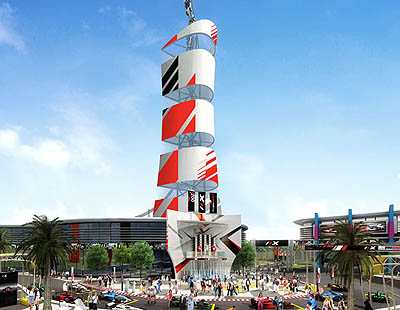


01/12/2012
NEWS STORY
 |
Only Bernie Ecclestone could make money from a project which never saw the light of day. In 2005 plans were announced to open a Formula One theme park in Dubai. Concept art of the project was released, ground was broken and construction work began. It was part of the £40bn Dubailand development which was expected to span 107 square miles - twice the size of Disney World in Florida which is currently the world's largest theme park resort. It was easy to see from the start that Dubailand was destined for failure but it took more astute analysis to work out that one of the only people who would benefit from it is Ecclestone.
Theme parks work best when they are giving visitors the impression that they have entered a world of make-believe. The fairytale-themed Disneyland, probably the world's best-known park, was based on this premise when it opened in California in 1955. Since then Disney has opened parks themed to space, movies and foreign civilisations but the common factor is still the same - they are places that visitors will not have had a chance to visit before.
In contrast, why would people visit an F1 theme park when they could go to see an actual race? This was the question which Pitpass' business editor Christian Sylt asked when he first heard about the project. Sylt and his colleague Caroline Reid are the only journalists worldwide who regularly cover the business of F1 for national media but in addition they are amongst only a handful who specialise in writing about the theme park industry.
It soon became clear that some of the only people likely to benefit were Ecclestone and his business partners in the Delta Topco company which runs F1. Others were suckered in regardless. Surprise surprise the brakes were put on the theme park project soon after the Dubai property market crashed during the recession a few years ago.
In 2010 Ecclestone revealed to Pitpass that the F1 theme park "is not happening" but he added that Delta Topco had nevertheless been paid by Dubai-based developer Union Properties. An indication of how much it received has now come to light in recently-produced F1 company documents which state that revenues from Middle East in 2010 increased by $21m to $142m. It was a 17.3% boost on the $121.1m revenue from the region in 2009 and, according to the documents, was primarily due to escalators in television and race promotion contracts, new fees for standalone GP2 and support races in Abu Dhabi and Bahrain and "fees received for an aborted theme park deal in Dubai."
Ecclestone could not have predicted that the property market would crash after he signed the agreement for the theme park but he made sure that F1 would not lose out if it did. He has even managed to get F1 exposure in a theme park as it is a prominent part of the Ferrari World development which opened in Abu Dhabi in 2010. The Scuderia's agreement with Delta Topco allows it to use F1 footage in Ferrari World and acknowledges that the same rights will be offered to any other team which has a theme park dedicated to it. The agreement also includes "equivalent rights for up to two additional Ferrari-themed parks" and more may be on the way.
Ferrari World has been well-received and although there were plans to replicate it in Valencia these talks are currently at a stalemate because the Valencian government was unable to receive a guarantee that the park would not require state money. "It's a good investment, a very interesting investment, but what we will not do is have it as a cost for the Valencian government or community," said regional vice president Jose Ciscar earlier this month.
Unlike F1 itself, very few people ever get to see Ferrari's cars so they have almost as mythical a status as the fairytales which Disney's parks are based on. In contrast, this year F1 races were held in 19 countries and this number is growing with Russia the next new market to join when it hosts a Grand Prix in 2014. Likewise, whilst ticket prices are far from bargain basement here in the UK, they start from as little as £13 in Malaysia. So, if F1 decides to press ahead with its own theme park plans in future it first may be better off ensuring that ticket prices rise beyond the reach of a mass market audience. Ecclestone would certainly be up to the task.